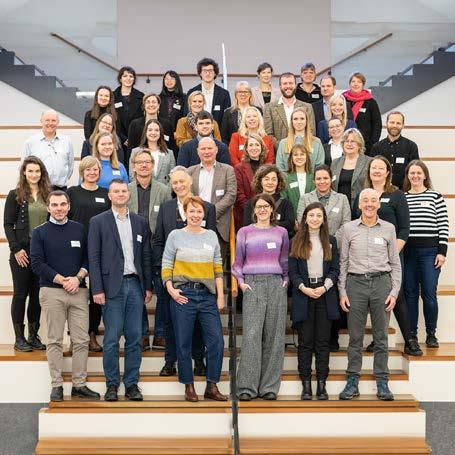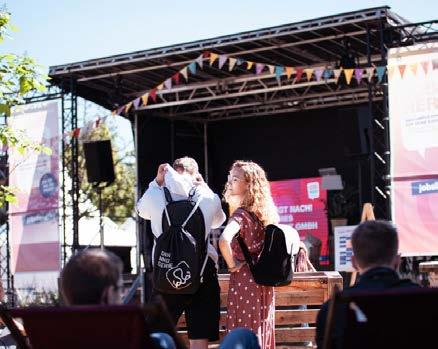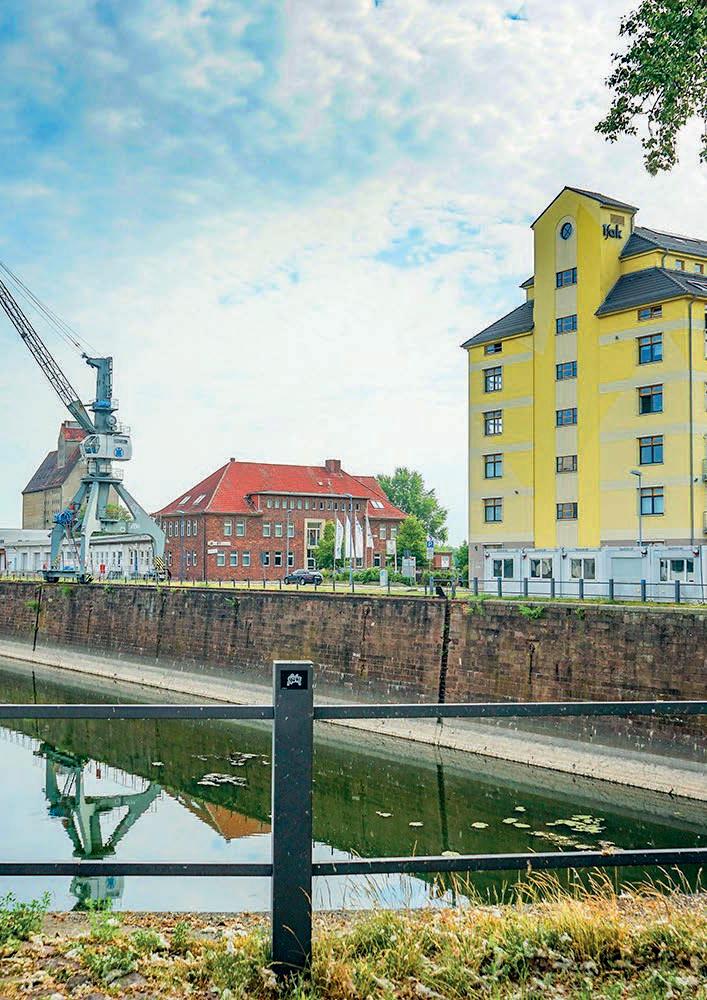

2050 Cities
Cities and universities working together to attract and retain talent An EUniverCities



Cities and universities working together to attract and retain talent An EUniverCities
EUniverCities1 is a European network, launched in 2012, in which mediumsized cities and universities work together in ‘tandems’ – to give knowledge cities more visibility within Europe. Both the city and the university need to be members of the network – so the views and needs of both are represented. The Network aims to exchange and share knowledge, expertise and experience in cityuniversity co-operation across urban Europe.
Network members learn from each other how to shape cooperation in a fruitful way, apply lessons, take next steps at a local level, and spread knowledge and ideas. The current ambitions and aims as well as the conditions of cooperation between the partners are defined in the Network Strategy 2023 – 20252. The network is accompanied by Willem van Winden of Urban IQ, as an External Expert.
Each year the Network addresses particular issues identified by members, and in December 2023 in Magdeburg it sought to explore the topic of how to retain and attract talent in cities. Earlier that year in Lublin the Network also addressed a number of themes pertinent to this topic, and lessons from these are also incorporated within this cookbook. The network is always open to new city-university tandems looking to join with us.
We have chosen to call this a cookbook as the emphasis is very much on lessons and practical examples (recipes).
Whilst these may not all be readily transferable to other cities they do offer real world examples of what has been achieved and the steps and partners (ingredients) needed to make this happen.
1 https://eunivercitiesnetwork.com/
2 EUniverCities-Strategy-2023-25.pdf (eunivercitiesnetwork.com)

Many European cities are facing a shortage of well-educated and skilled workers in their economy. So, how can cities and their universities work together to attract and retain the best skills and talent? This was the central question discussed during a meeting of the EUniverCities Network in Magdeburg in early December 2023. The meeting brought together representatives from 12 European cities and their universities. The attendees shared strategies and options and looked ahead to try and understand what was needed and how they could both respond positively to the new challenges.
Inevitably Europe’s labour and skills shortages are influencing city policy and priorities and there is a recognition, and a growing expectation, that universities can be part of the solution. Some potential routes for university influence and support to their city are clear and well understood and are receiving ever greater attention, such as:
l University business spin outs
l Student and graduate placements
l Career support and advice
l Entrepreneurship support
Other solutions are less well-developed but offer great potential, such as service learning and new holistic curricula – embracing activities outside of just traditional taught subjects.
This report summarises the highlights and main conclusions from our work in Magdeburg, and previously in Lublin. It presents innovative examples from the network and beyond, and tries to identify their key success factors.
The intended audience for this report comprises policymakers in city and regional authorities, university decision-makers, and those with an interest in the civic work of universities and the future of cities in general. It is not intended as a panacea, but as a way of quickly and effectively grasping an understanding of the issues and pressures faced by cities and universities trying to work together and as a ‘recipe’ guide for those looking for solutions.

Why is attracting and retaining talent important, and what is the scope for city-university collaboration? Some considerations are relevant:
l Labour and skills shortages. Europe is suffering from very considerable labour shortages3 with the most widespread shortage occupations in software, healthcare, construction and engineering trades. This is further intensified by the digital and green transition taking place, which is requiring new skill sets, and in some cases new highly skilled roles4. It was in response to this challenge that the European Commission launched the European Year of Skills (2023). Against this background, inevitably many cities and regions face particular shortages sometimes exacerbated by ‘predictable problems’ such as an ageing population or ‘unpredictable problems’ such as, in the case of two Network members – Intel’s announcement of a massive new investment in Magdeburg and a series of major industrial developments in Lublin.
l Universities are key attractors of new talent. Many students leave their city of study after graduation. Research has indicated strongly that graduate location decisions are often driven by the availability of long-term job opportunities5 . Research also suggests that simply seeking to retain graduates is not enough, and that cities should focus on underpinning or parallel themes such as supporting the creation of more high-skilled, knowledge-intensive jobs, rather than narrow policies focused on just graduate retention6. This also means intervening at a broader level with housing, transport, planning and skills policies aimed at making cities more attractive places for businesses to locate and for people to live in, irrespective of where they studied. Compared to big cities, small and medium sized cities must go ‘the extra mile’ to attract and retain graduates. They have a smaller labour market, often a lack of well-known big employers, and less ‘urban vibrancy’. They often lose international graduates
3 Labour shortages in Europe – is the labour market tightening? | European Labour Authority (europa.eu)
4 How is Europe addressing the labour crisis? | Euronews
5 https://www.centreforcities.org/reader/great-british-brain-drain/migration-students-graduates/
6 Myth #3: Cities must boost their graduate retention rates | Centre for Cities
because there are fewer employers (particularly small to medium ones) that widely use English and other international languages.
l Universities have become more international. Universities in Europe and further afield are recruiting growing numbers of international students (exchange and degree students) and staff7. It has also become more normal for companies to recruit international talent (globalisation). Hence talentattraction and talent-retention increasingly have an international dimension.

l Cities and universities have a common incentive to create a welcoming environment. This is beneficial both for national and international talent, and in supporting new arrivals to settle and integrate into the social, economic and cultural life of the city – whether short or longer term. International recruits who don’t settle easily, whether students or new employees, are a loss on many levels – personally, institutionally and financially. Recruitment of international employees sometimes entails added complexity if they relocate with their family, and here it is important to appreciate the needs of the whole family in terms of long term settlement and integration.
In this section we look at some of the underpinning strategic lessons that need to be understood when considering attracting and retaining talent.
Ahead of devising policies, strategies and new interventions/programmes it is critical to take an impartial look at the city and its university(ies), and to understand how you compare with other cities and destinations. Logically this means understanding many elements such as:
l Current student demography, recruitment and destinations
l University course curricula and how they can be changed/advanced
l Employer base (sectors, demography, skills gaps and skills needs)
l Economic and labour market forecasting and foresighting (understand the fiscal implications and potential)
l Priorities and forward strategies for major employers and rapidly growing sectors
l Where you have real competitive advantages and smart specialisations compared to other cities and regions
l Potential levers for change
As part of this it is also important to highlight potential benefits and potential impacts on the city from any proposed changes for the citizens and population.
Exeter currently is one of the UK’s fastest growing cities but like other cities in relatively rural regions, it also suffers from low levels of progression to Higher Education, pockets of deprivation, lack of social mobility and historically low levels of productivity. There is a pressing need to retain highly qualified and skilled workers traditionally drawn towards the South East of England and London, by creating an ecosystem of innovative, successful enterprises in growing sectors.
Escalator is an innovative means of understanding skills provision within a smart specialisation sector identified as being pivotal to both regional economic success and the provision
of high-quality jobs for those living and working locally. The model was developed in a partnership between the University of Exeter, Exeter College and Exeter City Council following consultation with local employers. It enables the partners to target existing resources effectively and to identify and fill any gaps.
Data Analytics was chosen as the major focus (specifically incorporating Environmental Intelligence) as Exeter is home to a globally significant cluster of climate and environment scientists with both the university and Met Office located in the city. Exeter is also home to a rapidly expanding nationally significant Tech Cluster.
Utilising the Escalator partners have been able to work collaboratively and individually to establish:
l A new South West Institute of Technology bringing together the region’s HEIs and FE Colleges to target world class technical education
l 12 new MSc Courses with 400 Masters students and 120 on Degree Apprenticeship Courses
l School Projects encouraging take up of data analytics in partnership with the MET Office
l Annual Summer Schools with the Institute for Coding targeting
humanities and social science students
l Innovation support for businesses via partners including SETSquared Exeter
l New HE Scholarship opportunities targeting diversity
l 66% Increase in data analyst roles in 4 years in Greater Exeter (Labour Insight 2016 – 2019)
l 90 Data analytic related student projects embedded in businesses New aligned investments include: University of Exeter Enterprise Zone; Centre for Doctoral Training in Environmental Intelligence; Environmental Futures Campus on Exeter Science Park, which is designed to accommodate 375 new environmental jobs; A new Environmental Futures and Big Data Impact Lab providing free, collaborative support from world-class scientists and technologists to support regional businesses; Partnering the Alan Turing Institute which is home to Exeter’s Institute for Data Science and Artificial Intelligence.
The Escalator concept has been shared widely through European programmes and through the European Network for Regional Labour Market Monitoring8.
8 European Network on Regional Labour Market Monitoring
Success in talent attraction and retention cannot be achieved solely by one player or even successfully by just the city and the university together. It is critical to build a form of helix – where employers, citizens and social partners are all involved, and effectively engaged within the proposals and direction of travel.
Leuven takes a very strategic approach to talent attraction and retention. In Magdeburg Natalie De Filette informed the Network about how city, university and major employers joined forces in Leuven MindGate: they meet frequently to discuss talent challenges, and set up the International House Leuven to cater for the needs of the many international people in the city: especially their social needs for things like friendship, community and a sense of belonging.
Leuven MindGate is the collaboration platform activating 400+ organisations to stimulate and rethink innovation in three core sectors in the Leuven Innovation Region and has been operating since 2015. The identified priority sectors are Health, High Tech, and Creativity.
The level of formal engagement between university and city varies by nation and even sometimes by region/ city. No ‘one size fits all’ is going to work as a first step but certainly, as a first step, clear agreement on joint action needs to be taken at the most senior level. This senior level relationship needs to be maintained for the long term. Civic agreements can be a useful model for this and many cities already have these.
It is important to recognise the role of talent management; it is important to be explicit about who does what, and coordinate well among the partners. Overleaf is an example of mapping talent management from Eindhoven.

Eindhoven’s “who does what” in talent attraction and retention
> Coming to Talent Attraction Programme Brainport
l Attracting and retaining students and knowledge workers
l Live and online marketing
l Building worldwide networks and communities
> Settling in Holland Expat Center South
l Formalities and services
l Giving a warm welcome to newcomers
l Helping people to organise their life (schools, clubs, banks etc.)
> Living in Holland Expat Center South
l Providing a high quality standard of living
l Helping people feel at home (vibrant city life and cultural offer)
l International education and spouse/partner programmes
> Strategy Talent Attraction Programme Brainport
l Advice and lobbying on international labour
l Conducting and linking researchers and projects
l Close relations with tiers of government(s), knowledge institutes and employer
From a regional labour market perspective, it makes sense to recruit students for the future labour market that you are targeting. This may well require establishing new or significantly expanded student curricula in particular subjects, and working closely with employers to seek investment to help develop against strategic priorities. Examples of activity for universities to consider include:
l Universities to proactively identify and incorporate emerging skills into new/revised courses
l Embed lecturers from local industry into university courses
l Consider using an industry advisory board to check revised study programmes
The territory of Parma has its roots in food culture in a history that, in order to cope with environmental and political constraints, has developed foods capable of lasting over time – by providing healthy food to the inhabitants of this territory. Over time, these foods have acquired a reputation that still allows them to bring the name of Parma to the world.
It is therefore only natural that the University of Parma has developed corresponding research competences and research focuses in this field. In particular, teaching and research are geared towards the needs of the food industry and through this the University of Parma is making a name for itself as a university of excellence in the food sector. This attracts students from all over the world.
With the Food Project, the University of Parma brings companies, research centres and educational partners at local, national and international level together to make the University of Parma a recognised European hub in the field of higher education and training for Food.
This model can be understood as the “Local Agri-food System”, capable of producing interactions and synergies between supply chains and between different types of companies. In this logic, the University of Parma is a central player in the process of development of the territorial system linked to food in the province of Parma acting on three levels:
l Bachelor’s Degree, Master’s Degree, specialisation courses and advanced training. Every year the University of Parma receives over 2000 new students in food-related courses;
l acting as “technical assistance” for small, medium and large enterprises in the food sector and in the agri-food machinery sector;
l playing the role of “technological antenna” through technological, economic, managerial and social research activities related to the production, processing and consumption of food.
The Food Project of the University of Parma therefore aims to represent a modern and flexible tool for dialogue between researchers and the business world that deals with its production and marketing, also anticipating the future European indications envisaged by the “new green deal” and the “farm2fork” strategy.

It makes sense to explore the theme of attracting and retaining talent through an ‘economic lens’. However, the students in our Magdeburg meeting, who actively participated in all the discussions, and also met in a students-only session, stressed that student attraction and retention must not be approached solely from an economic angle. Quality of life and an enjoyable university experience are also very important factors. They sought ‘life-friendly’, sustainable cities, where students from all over the world can have a sense of shared values, can feel at home, are accepted, and connected. They want to have their voices heard and be able to express themselves culturally in the city, rather than being treated like temporary, somewhat noisy passers-by who might eventually be of interest to employers as future candidates within the local labour market.
Moreover, universities serve the needs of industry best by stimulating curiosity, and teaching students to deal with change and ambiguity, as well as how to collaborate with others and have an open mind. This requires new learning concepts in which city and university collaborate: develop a learning city in which student teams address societal challenges such as decarbonisation, social problems, urban sustainability etc.
RECIPE 5. Talent does not necessarily equate to highly educated!
We heard first hand from Intel during the meeting and further discussed the importance of character and soft skills when recruiting, possibly invoking the old adage ‘Hire for attitude (character); train for skills’.
Above all, innate curiosity was deemed to be one of the most important attributes for long term success. Assessment centres will often pick up softer skills such as team work, leadership, emotional intelligence etc. above hard qualifications.
This is important for universities to consider. Many students value their work in communities, in clubs and societies, placements and other extracurricular activities as the most enjoyable aspects of university life and where they learned many new (often soft) skills. Being able to offer a truly wide and holistic experience at university will become more and more important in the quest for the best students and as a means of attracting the best talent.

This section contains a number of concrete projects or initiatives to attract and retain talent, presented and discussed during our meetings in Magdeburg and Lublin. Amongst the basics for talent attraction and retention include:
l affordable student accommodation
l support with visas and other forms of bureaucracy (may also be linked to national policies)
l help with settling-in other family members, including help for them to find jobs
l safety (and feeling safe)
An initiative of the City of Leuven and Leuven MindGate, the International House Leuven9 is an information, knowledge and service centre for international employees and their families, and for organisations in the Leuven region employing international talent. It is jointly owned and funded with single branding. Established to provide support relative to relocation, social integration, living and working in the Leuven region, International House Leuven is the vibrant hub for local networking and community building. It strengthens and showcases Leuven’s diverse and international character. Currently the offer includes:
l a single point of contact for questions relating to living in Leuven
9 https://www.internationalhouseleuven.be/
l regular newcomers’ webinars and evenings, providing an opportunity for newly arrived people to get an introduction to their new home city and ask any questions that may pop up during those first weeks
l regular information sessions and workshops on a variety of topics such as renting, healthcare, culture shock
l all relevant information (also in English) available on one central portal website
l the opportunity to join a range of social activities such as going to the theatre, cooking workshops, guided walks
l a monthly newsletter announcing activities as well as language neutral regional events combined with other “good to knows”
l information sessions and webinars on (re)starting a career in Leuven and an intensive (partner) career program
l a Welcome Ambassador Program, teaming up Leuven residents (international or not) with new international individuals to offer guidance and support
It strives to offer events that are free to the public (both internationals and locals) with help from volunteers who invest their time, ideas, and knowledge into many of workshops and events.
Key lessons from the approach are:
1. Surf the biggest wave available: use existing systems, organisations, to jointly tackle common challenges and think big.
2. Speed and efficiency: deliver proof of concept fast and select high impact strategic partners.
3. Build on achievements to broaden reach and funding – success is the most powerful sales pitch.
A similar concept has been created in Lublin at the University of Maria CurieSklodowska. The UMCS ‘Welcome Centre’ offers a range of services for international students, staff and visitors, including organising events, business mentoring sessions, language workshops and English translation services, plus a mobile App that helps familiarise users with the University campus and life in the city. The overall concept is about creating a welcoming and supportive environment that celebrates multiculturalism.

Quality ‘side jobs’ greatly help to retain students after graduation and this is a win-win for employer and student. Leo Robben, director at EuFlex at Eindhoven University underlined that student side jobs (not in shops or bars but at a higher level) are key to connecting students to local and regional firms – when presenting at the Magdeburg event. He developed EUflex as a dedicated platform that connects an impressive 2,500 students with good-quality side jobs in the regional labour market (averaging 8 hours per week with a maximum of 16 hours per week). They very often result in permanent positions sooner or later: a win-win for the student, who has an interesting and better paid side job, and the employer, which also saves on recruiting efforts. If trying to replicate this model there are some challenges to be overcome:
1. Convince your institution (internships can lead to projects and research income)
a. Model yourselves on a company structure to give confidence to business
b. Look outside to raise funding
c. Try to attract staff with business experience
d. Try to keep rules to the minimum to allow flexibility
2. Convince employers
a. They can be quite short-term focused (convince them to look longer term) and finance driven (paid staff vs interns)
b. You need to offer something competitive with job agencies
The unique selling points for such activities are:
l They are close to available candidates (undergraduates and postgraduates, so know who will be best for the role)
l The ‘well’ of talent never dries up
l Expertise relevant to the content of the job
l Reliable partner as university connected
l Revenues support the university (and future provision of employees)
At the network’s meeting in Lublin, delegates heard about the highly successful ‘Ghentrepreneur’ programme that has been running for over 10 years. Students studying in Ghent who have a business idea they want to develop have access to a well-established and comprehensive support package. In addition to receiving practical advice on areas such as marketing and finance,
students can continue their studies whilst pursuing their business venture, earn money, and benefit from the growing young entrepreneur community in the city who can act as mentors and role models. Whether their fledgling businesses continue after graduation or not, simply being part of the Ghentrepreneur programme makes them highly sought after candidates in the jobs market.
Therese Lindkvist from Linköping highlighted a special talent category: PhD graduates. Only a fraction of them can expect a successful career in academia, the others must find their way into business or industry. PhD
students should be better prepared to work in industry, for instance in graduate schools, and companies must be less hesitant to hire “too theoretical” PhDs.
Paul Blackmore (University of Exeter) showed his university’s arsenal of initiatives to help graduates find a job in the wider region, among which is a single portal for internships with 12,000 positions. Their strategy is to engage the students from Day 1 in the regional labour market (not just by the end of their studies). This helps to ‘sow the seed’ and normalise the idea of staying in the city after graduation. Fundamental aspects that aid retention are:
l Career Management Skills/Career mindedness
l Sense of belonging/normalising idea of ‘staying’
l Access to jobs (of relevance/interest to students)
l A ‘level playing field’ (with required interventions)
l Immersive and experiential learning including placements/internships -> [evidence of…] core skills/ competencies for the workplace
This all needs to be part of a coherent offering and aligned to institutional strategies to aid communications and avoid confusion/duplication of provision.
In Sweden, many students are recruited through networking. However, many international workers and students lack established professional networks in their early years in Sweden. Therefore, the Linköping Science Park initiative “Switch to Sweden10” creates matchmaking activities between international knowledge workers who are already in Sweden and companies at both a regional and national level. Success to date includes:
l 918 Candidates
l 273 Companies
l 241 Matches
10 Switch to Sweden - Linköping Science Park (linkopingsciencepark.se)
It may help to set up programmes that support local companies to hire international graduates even if they haven’t necessarily perfectly mastered the national language. By setting the fluency bar too high, organisations can effectively miss out on lots of highly
talented applicants. Companies should be encouraged to perhaps set up ‘buddying or mentoring’ arrangements or possibly one English-language team in their company where international workers, graduates, and placements can more easily work.
The Linköping Science Park attaches great importance to supporting its workers and companies. It has developed a welcome book11 as a field guide for international talent who desire to explore living and working in Sweden. The book addresses most of the common needs expressed by international professionals and students from an early stage to facilitate their landing process in the country from day one. Added to that they published a Local Guide to life in East Sweden, Östergötland:
l An introduction to Sweden and the people with a DNA built by the freedom to roam and digitalisation.
The numbers, the traditions and the food. Swedish history, all you need to know about the sustainable identity of Sweden.
l Local guide to Linköping – This is your local guide to life in East Sweden, Östergötland. “It is an area where you can design a life that suits your needs and dreams. It is an area where tech is as important as the archipelago, the forests, the agricultural landscape and the diversity in everything in between.”
11 The Insider’s Guide to Moving and Living in Sweden - Linköping Science Park
What does a medium-sized city of talent look like in 2050?
Results from an EUniverCities Foresight Exercise
Diverse, international population
Vibrant cultural & leisure offer
High quality education & training
Excellent public services & transport networks
Good orientation & welcome services
Communal meeting places & language support services
Mixed housing & affordable living costs
Democratic with strong, integrated communities
At the Magdeburg event after considerable exploration of existing and good practices the EUniverCities partners explored what a successful medium-sized city of talent would look like to the outside world. Partners considered the following questions to help guide discussions:
l What are your fundamental assumptions/strategic notions?
l Who needs to be involved in what activities?
l What has to be done, in what order?
l How does communications work and how do we reach our clients/ target group?
There was considerable overlap between the various groups which explored what success looked like, and referencing the Cookbook structure of the work – recognising that ultimately ‘the recipe’ will be provided by students and citizens in the city, whilst ‘the kitchen’ will be provided collaboratively by the university and the city (and other partners).
As well as what the city would look like, partners also explored what steps were needed to get there.
In appearance the city would have a relatively young demographic, driven both by the students and as a result of it being an attractive place to live and work. This was summed up in one workshop as – ‘joyful, fresh and creative’. The demographic is also likely to be quite international and cosmopolitan. The demand for talent is itself international and we already see successful cities reaching out far and wide. It would be underpinned by some significant, and challenging necessities such as an adequate supply of affordable, and mixed use/types of housing as it needs to be able to house people in all stages of life.
Logically small and medium sized cities cannot be recognised for international expertise/leadership in all areas of science, social science and industry. They are fortunate if they are competitive globally in one. However, we felt that to be successful, being recognised as different to elsewhere, in a positive way, is likely to require some form of differentiated offer. To be associated with something global and international that gives a sense of international identity. Cities such as Einhoven have this through association with industrial giants such as Philips, Parma through its global leadership in food, Intel will greatly influence
perceptions of Magdeburg, and Exeter is seeking similar through its work on Climate Science with the Met Office.
As well as some practical requirements that fell out of being a city that attracts talent, such as clear routes for new people to engage with community and to get information on things like relocation, childcare, education etc. (one-stop shop for new citizens) there was also a more challenging development which was for the city to take on a positive, confident and welcoming persona. One that is willing to listen and integrate, able to communicate in an open and transparent way with the world and its citizens, and confident in itself and where it is going as a city. To have a vision of what the city is and why it is taking this path.
It was important to recognise the many organisations within the ecosystem, all of which have a major role to play. The city must be representative of its population. The ecosystem therefore combines:
l Citizens and workforce (fundamental to whether the ideas are accepted or not and a source of solutions and leadership)
l Employers (willing to recruit, host placements, look to the future and innovate)
l Social partners (sharing a vision for where the city is going and helping overcome any negative impacts for working people)
l The innovation ecosystem (Institutes and Science Parks are key elements in the ecosystem along with university/state and private research)
l Education at all levels (universities are clearly key in recruiting international talent but the education system needs to be inclusive and high quality)
l Health system (guaranteeing access to health and social care for those it is seeking to attract and those it already relies upon)
l Student community (playing a full part as welcomed citizens who live with and not just in the city)
l Community groups and third sector (offering a voice to communities and linking student residents and non-student residents opportunities to come together for mutual benefit and support)
l Services (transport, facilities, visa support)
It will be necessary for a group to drive these changes. Realistically this is going to include the following and the most challenging aspects will be ensuring a responsive process is in place that values bottom-up engagement and doesn’t seek to dominate discussion, pace or direction. Essential partners are:
l Local community organisations
l Students and in particular student groups
l University leaders and those with civic roles
l City leaders and administration
l Employers
l Education partners
One group foresaw a need for new types of structure bringing together population assemblies – engaging every part of society with openness and volunteering major elements. These assemblies would involve a mix of young people (25%), older people (25%) and middle aged (50%).
Coordination by the city and assembly taking decisions – communication is clearly vital. Success will require not just communicating a complex message in many ways to many audiences but hangs on the city’s ability to engage
and listen and respond. Voices within the community are incredibly important here.
The workshops recognised that much work needs to be done if cities are to change in the ways described above and that we should start working as soon as possible. Frameworks for taking forward concerted action of this kind exist in most of the EUniverCities members (civic agreements for example), nonetheless what we are describing will require considerable energy and buy-in from the ecosystem.
Common themes identified recognised the vital role of a common formal strategy with elements such as:
l Housing plans (Mixed)
l A focus on education and teaching
l Improved public transport
l Innovative services to help and support
l Involving talents and students in planning
l Language (ability for all to communicate)
l Transparency and visibility
l Meetings and exchanges to change behaviour and patterns (adaption, flexibility, decision-making)
l Finances
l Catalysers
l Sport and cultural activities/places
l Public services
l Sustainable and attractive infrastructure
l Health system
Though progress would be difficult there were recognised tools and techniques that could help the participants to progress. A number of these had been presented at the event and others can be referenced in the Network Handbook. Examples cited in the Magdeburg event included:
1. Reverse mentorship (sometimes called upwards mentoring) – which pairs senior managers with young and/or relatively new recruits but where the lessons and expertise are passed to the more senior member of staff. This often involves digital skills of various kinds.
2. Internships – where students and recent graduates are placed within employers looking for support in particular areas. This offers benefits to all involved and is seen as core to many graduate offers in universities – as well as relatively straightforward to arrange.
3. Green Consultants – an example of a specific support offered to SMEs by the University of Exeter where students are trained to do green audits ahead of an internship. Other models of this kind include different skill sets such as digital.
4. Pint of Science – “provides a space for researchers and members of the public alike to come together, be curious, and chat about research in a relaxed environment outside of mysterious laboratories or daunting dark lecture theatres”.

The Exeter Escalator is a means of mapping and understanding current and proposed provision within Data Analytics. This enables us to target existing resource effectively and to identify and fill any apparent skills gaps. The Escalator has been developed in partnership with our colleagues in Exeter City Council and Exeter College.
